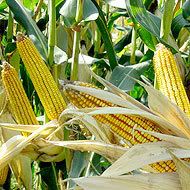Scientists discover maize oil gene; could help development of high yielding oil crops
 A team of crop geneticists in the United States have identified a key gene that determines oil yield in maize kernels, a finding that could have repercussions for the fast-expanding biofuels industry with applications in developing high yielding oil crops. Results are published as an advance online article in Nature Genetics.
A team of crop geneticists in the United States have identified a key gene that determines oil yield in maize kernels, a finding that could have repercussions for the fast-expanding biofuels industry with applications in developing high yielding oil crops. Results are published as an advance online article in Nature Genetics.Lead author Bo Shen, plant scientist of DuPont unit Pioneer Hi-Bred International, writes oil is an important renewable resource for biodiesel production and for dietary consumption by humans and livestock.
Through genetic mapping of the oil trait in plants, studies have reported multiple quantitative trait loci (QTLs) with small effects, but the molecular basis of oil QTLs remains largely unknown. The researchers discovered a high-oil QTL which affects maize seed oil and oleic-acid contents by encoding an acyl-CoA:diacylglycerol acyltransferase (DGAT), which catalyzes the final step of oil synthesis.
The gene that encodes for the catalysing enzyme lies on Chromosome 6 of the maize genome.
In addition, a tiny amino acid variant within this gene can boost the yield of oil and oleic acid - the sought-after edible fat in corn - by up to 41 percent and 107 percent respectively.
The paper, written by a 16 strong team from the US chemicals and agribusiness giant DuPont, was based on a comparison of 71 strains of maize whose oil content ranged from low to high:
 energy :: sustainability :: biomass :: bioenergy :: biofuels :: biodiesel :: oilseed :: maize :: genetics :: biotechnology ::
energy :: sustainability :: biomass :: bioenergy :: biofuels :: biodiesel :: oilseed :: maize :: genetics :: biotechnology :: Their work provides insights into the molecular basis of natural variation of oil and oleic-acid contents in plants and highlights DGAT as a promising target for increasing oil and oleic-acid contents in other crops.
Present-generation biodiesel is derived from oilseed crops such as soybean, palm oil, jatropha and rapeseed. Some of these have low yields but a low environmental footprint while others with higher yields can have detrimental effects on the environment if their cultivation leads to, e.g. deforestation or peat swamp destruction.
By boosting oil yields, less land would be required, the energy balance of the fuel would increase, it would help reduce greenhouse gas emissions further and pressures on the environment would be lowered.
References:
Peizhong Zheng, William B Allen, Keith Roesler, Mark E Williams, Shirong Zhang, Jiming Li, Kimberly Glassman, Jerry Ranch, Douglas Nubel, William Solawetz, Dinakar Bhattramakki, Victor Llaca, Stéphane Deschamps, Gan-Yuan Zhong, Mitchell C Tarczynski & Bo Shen, "A phenylalanine in DGAT is a key determinant of oil content and composition in maize", Nature Genetics, Published online: 17 February 2008 | doi:10.1038/ng.85
 --------------
--------------

 The Andersons, Inc. and Marathon Oil Corporation today jointly announced ethanol production has begun at their 110-million gallon ethanol plant located in Greenville, Ohio. Along with the 110 million gallons of ethanol, the plant annually will produce 350,000 tons of distillers dried grains, an animal feed ingredient.
The Andersons, Inc. and Marathon Oil Corporation today jointly announced ethanol production has begun at their 110-million gallon ethanol plant located in Greenville, Ohio. Along with the 110 million gallons of ethanol, the plant annually will produce 350,000 tons of distillers dried grains, an animal feed ingredient.








0 Comments:
Post a Comment
Links to this post:
Create a Link
<< Home